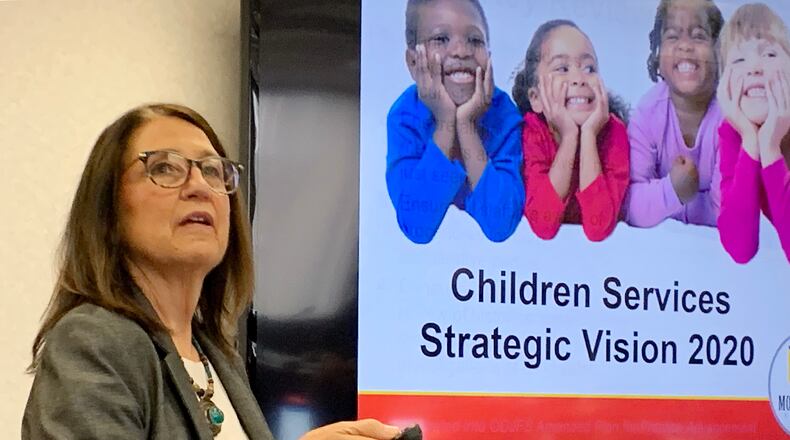"What what we’re talking about ... is what emergency situations will drive us being able to assert ourselves into situations with either a court order or to get a court order to see and interview children,” she said.
The strategic plan comes after a year of turmoil at Children Services.
Following the death last year of 10-year-old Takoda Collins and a case involving an infant earlier this year, Ohio Gov. Mike DeWine ordered a state review of “alternative response” cases handled by the agency. A regular review conducted in late 2019 by the Ohio Department of Job and Family Services was followed by an examination ordered by county commissioners.
According to the county, key findings of the reviews identified the following issues for improvement:
- Clarify policy and procedures for emergency circumstances.
- Ensure all household members are interviewed.
- Ensure staff are aware of procedures for non-cooperative parties.
- Clarify circumstances that require consultation with the Child Protection Unit of the prosecutor’s office.
- Ensure staff are knowledgeable of the Child Abuse Prevention and Treatment Act, parents' rights, and the ability to contact collateral sources of information without parental consent.
An agency “red flag” policy is being updated, Shaw said at Tuesday’s Montgomery County Commission meeting.
“We want to do some revisions to that to make sure it clearly spells out for staff what things elevate the case to different points of review, for example, young mothers who have multiple children and may have a higher level of frustration or families where there’s untreated substance abuse or mental health problems.”
.
The red flag policy also calls for a complete exploration of case histories — for both alternative and traditional cases — were information might be found in other counties or states, Shaw said.
“We need to thoroughly explore whether there’s historical information somewhere else that we need to access,” she said.
A Dayton Daily News investigation earlier this year found that a half dozen agencies and institutions in three states were at some point involved in attempting to protect the well-being of Takoda Collins, but the information was rarely shared.
Another key to improving outcomes for children is a renewed focus on mandated reporting and the sharing of information, said Montgomery County Administrator Michael Colbert.
Montgomery County is taking a lead in implementing changes to Ohio’s Statewide Automated Child Welfare Information System, or SACWIS registry, and the county is updating mandatory reporting agreements with the prosecutor’s office, area law enforcement agencies, schools and other social service agencies, Colbert said.
“We’re not going to just say you’re a mandated reporter and give you some training, though we are going to enhance our training," he said. "But we’re also going to bring the partners together periodically so that they can engage and say where are the pressure points in the system that we haven’t had an opportunity to connect on? We’ll be able to talk about specific cases. We’ll be able to work together so that we know in these instances we need to communicate.”
The agency will also require that all household members be interviewed during safety assessments. Additionally, before high-risk cases can be closed in the future, a manager will have to provide approval, a function currently done by supervisors.
Shaw also outlined a reorganization of agency staff designed to provide for greater specialization among caseworkers, enhanced compliance review and training, and a more deliberate approach to diversity and inclusion.
The reorganization will help caseworkers focus on one duty, either the intake or ongoing care of children, said Jane Hay, local president of the Professionals Guild of Ohio that represents union Children Services employees.
“This means that workers will have more time to focus on their area of expertise when working with families,” she said.
Children Services will also participate in regular meetings with the Child Protection Unit of the Montgomery County Prosecutor’s Office to assist caseworkers in elevating cases through legal means when appropriate, according to the county. Elevating cases could provide grounds for child interviews without parental consent, along with other legal avenues to protect children potentially in danger.
Children Services is also adding a new manager of community and client outcomes. The manager will oversee five supervisors and staff who will focus on client outcomes, according to the county.
At the end of July, Children Services had 2,614 child abuse and neglect cases and 663 kids in foster care. The agency made 3,793 abuse and neglect investigations during 2019.
Shaw said the policy changes are interdependent.
“I really can’t tease out one thing that is more important than another,” she said.
Colbert said the changes are in progress but could take until the end of the year to complete, with changes to the state’s child abuse and neglect registry taking longer.
The changes will improve the system, but won’t prevent every tragedy, Colbert said.
“We know the system is going to be better,” he said “We’re never going to be able to change human behavior. We can’t. It’s just always going to be these things out there that are going to come up.”
Dayton Daily News Investigates
Our reporters are holding accountable area agencies tasked with keeping children safe from abuse or neglect, and investigating whether their actions are protecting children. Your subscription makes this coverage possible.
About the Author

